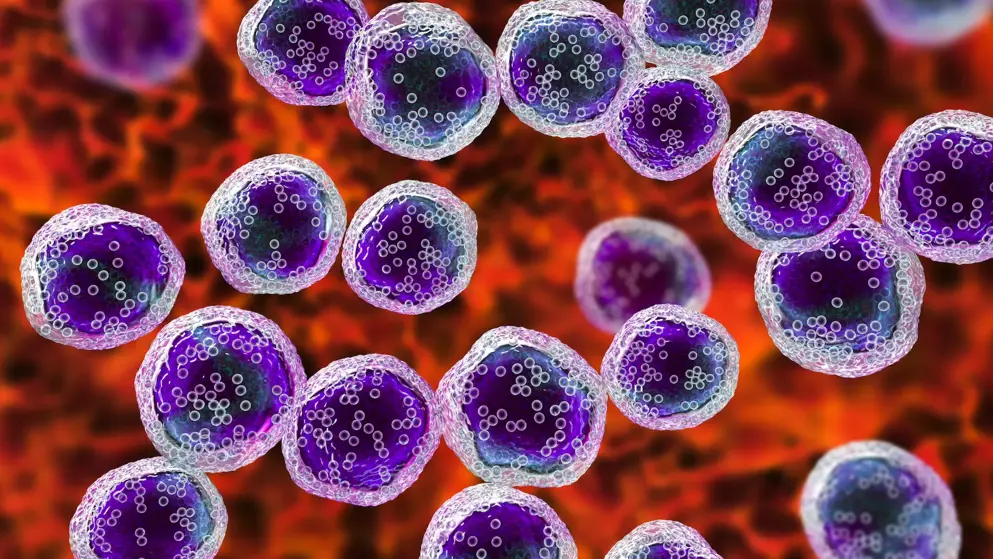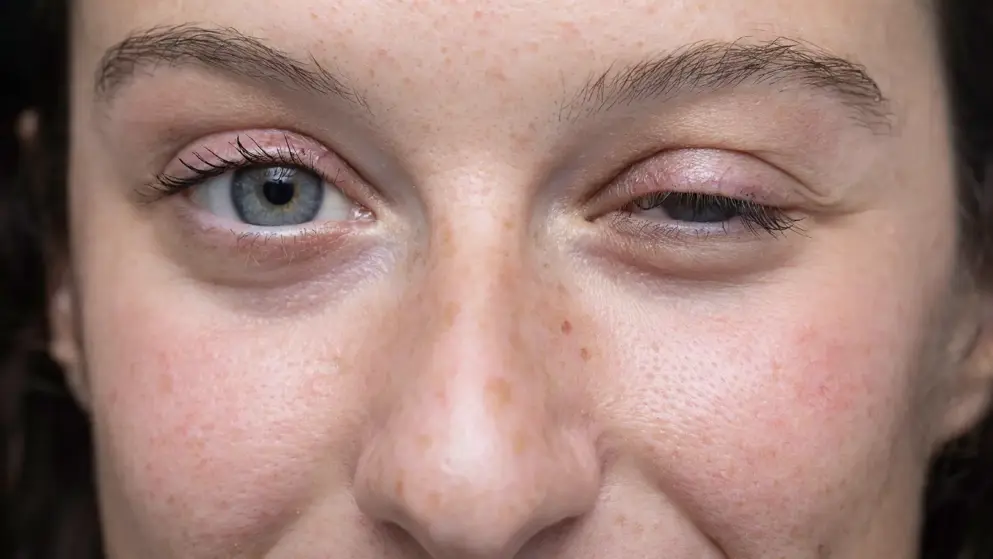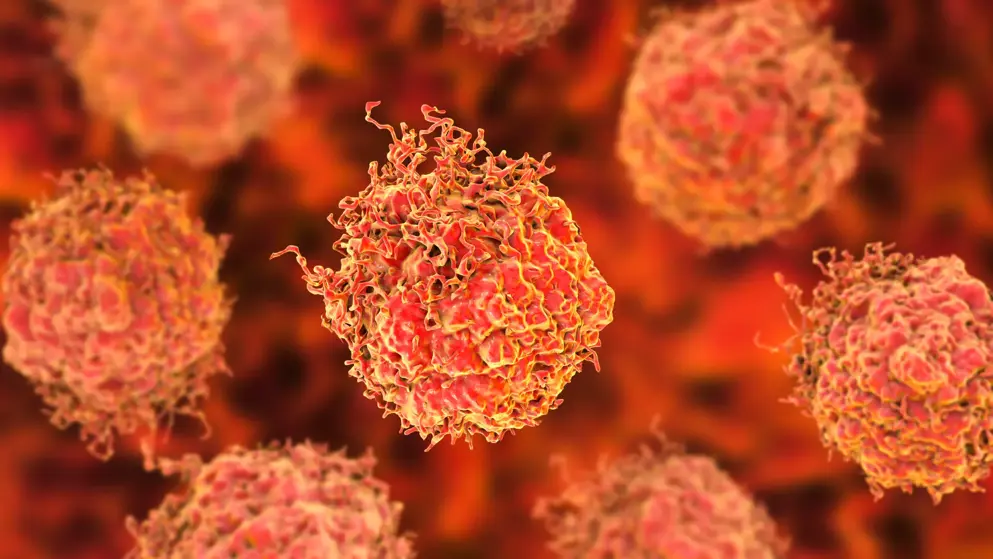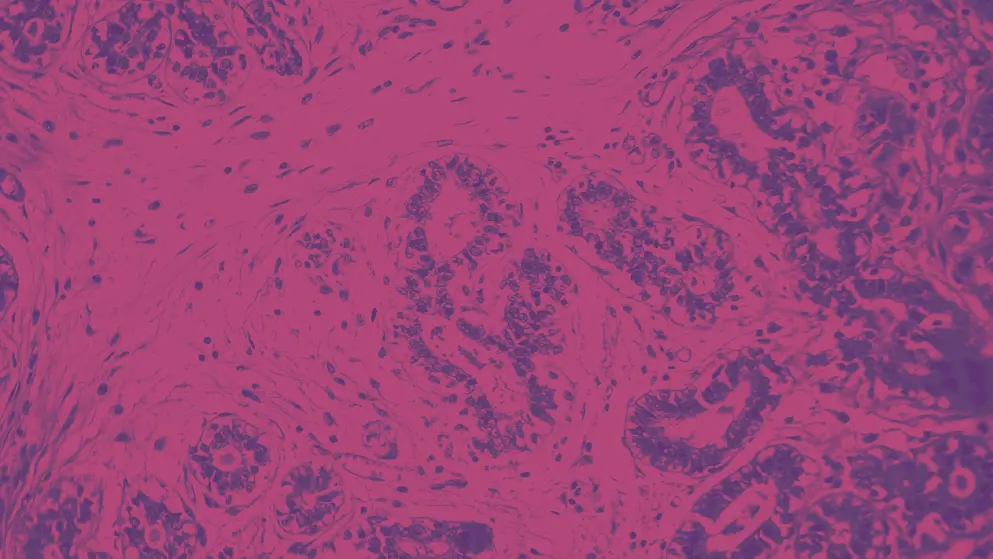
Breast Cancer 2023 Wrapped
2023 takeaways: Advances in adjuvant therapies for high-risk HER2+ early breast cancer
Edited to include details on adjuvant treatment selection, clinical trials information, and other minor corrections, 5 February 2024.
Around one in five people with early-stage breast cancer (EBC) have human epidermal growth factor 2-positive (HER2+) cancer, a subtype driven by HER2 overexpression.1 Historically, HER2+ EBCs are more aggressive than HER2-negative EBCs and are associated with chemotherapy resistance and metastases.1
In recent decades, the addition of anti-HER2 targeted therapies to the clinical armamentarium has led to an increase in survival rates for people with HER2+ EBC.2,3 However, many patients continue to be at risk of disease relapse.1,3
Identifying patients’ risk of disease relapse is paramount to optimising the treatment approach and maximising clinical outcomes.4 Typically, high-risk patients have:5,6
- A tumour diameter of ≥2 cm and/or node-positive disease, or
- Any residual disease following neoadjuvant therapy
What are the current therapeutic options and unmet needs for people with HER2+ EBC?
According to the 2023 ESMO guidelines, people with high-risk HER2+ EBC should receive neoadjuvant chemotherapy and anti-HER2 targeted therapy (preferably trastuzumab/pertuzumab).7 Following surgery, patients should receive tailored adjuvant therapy, with options including trastuzumab, trastuzumab/pertuzumab, trastuzumab emtansine (T-DM1), and neratinib.7 Selection of treatment option is determined by patient factors including surgical response, presence of nodes at initial diagnosis, and hormone-receptor positivity. Adjuvant endocrine therapy is recommended for all people with hormone-receptor positive disease.7
While it’s possible to achieve pathological complete response with these therapies, there remains an unmet clinical need to prevent the relapse of disease and the development of metastases.7,8 Once metastatic, almost all people with HER2+ EBC will die from the disease.1
There is also a lack of consistency with defining ‘high-risk’ cases, and the criteria for clinical trials varies.4 In addition to tumour size, node positivity and residual disease after neoadjuvant therapy, high-risk factors for people with HER2+ EBC include:1
- Higher BMI
- Younger age at diagnosis
- Hormone receptor positivity
- Low levels of tumour-infiltrating lymphocytes
- Low expression of Ki-67
Professor Rupert Bartsch reflects on the challenge of brain metastases in HER2+ EBC, covering treatment options and strategies for prevention.
Professor Rupert Bartsch considers the current landscape of adjuvant therapies, including unmet needs that remain to be addressed to further improve the outcome for people with HER2+ EBC.
What were the major advancements in adjuvant therapies for high-risk HER2+ EBC in 2023?
Three key developments from 2023 concerning adjuvant therapies for HER2+ EBC and their role in addressing the clinical need to reduce disease relapse were:
- Real-world evidence for neratinib supported clinical trial data. In May 2023, the real-world evidence of neratinib in the extended adjuvant setting were presented at ESMO Breast Cancer.9 Consistent with data from the ExteNET trial, the 12-month and 24-month invasive disease-free survival (IDFS) rates were 97.5% and 96.0%, respectively. The real-world data showed no new safety findings, and diarrhoea was the most common adverse event.
- Chemotherapy de-escalation (including use only in the adjuvant setting) may be a viable therapeutic option. In June 2023, the results of the second primary endpoint for the PHERGain trial were presented at ASCO.10 PHERGain investigated the possibility of chemotherapy de-escalation; the intent-to-treat population received trastuzumab and pertuzumab, and only received chemotherapy if there was no response after cycle 2, or no pathological complete response after surgery.10,11 For these patients, the 3-year IDFS rate was 95.4%.10 The rate of treatment-related adverse events was lower in this group compared with the patients who received chemotherapy as standard neoadjuvant therapy (grade ≥3, 32.9% vs 61.8% [p=0.01]).
- Final IDFS rates for T-DM1 were consistent with the primary analysis. In December 2023, follow-up data from the KATHERINE trial were presented at the San Antonio Breast Cancer Symposium (SABCS).12 KATHERINE compared trastuzumab with antibody–drug conjugate T-DM1 in people with high-risk HER2+ EBC.13 Landmark 7-year IDFS rates were 67.1% and 80.8% for trastuzumab and T-DM1, respectively, supporting the primary analysis.12
These data are invaluable in helping oncologists to refine clinical management and direct future research for people with HER2+ EBC.
Professor Rupert Bartsch discusses the role of chemotherapy with the current treatment armamentarium for HER2+ EBC and shares his hopes for the future.
Areas of interest in 2024
In 2024, further developments in this field are certain. For example, while IDFS rates with neratinib are favourable, many patients report diarrhoea, which is the primary reason for discontinuation.14,15 The DIANER study will continue enrolling patients in 2024 and compare the top three anti-diarrhoeal prophylaxis strategies combined with neratinib from the CONTROL study.16 This may help oncologists to minimise discontinuation of neratinib and reduce relapse rates.
Combinations with neratinib are not currently indicated in breast cancer.17 However, questions that require clarification and we hope to be addressed in 2024 include:
- Can neratinib be used in combination with trastuzumab and/or pertuzumab for high-risk HER2+ EBC to mitigate the risk of relapse?
- What is the impact of using neratinib in combination with antibody–drug conjugates such as T-DM1?
To date, the first question has been investigated in the metastatic breast cancer setting only, but the investigators suggest looking at this combination in the EBC setting as well.18 There is an ongoing trial addressing the second question in the EBC setting, which is expected to be completed by July 2025.19,20 Answers to these questions may help to reduce the risk of disease relapse and represent potential breakthroughs that will continue to enhance the lives of those affected by HER2+ EBC.
References
- O'Shaughnessy J, Gradishar W, O'Regan R, Gadi V. Risk of Recurrence in Patients With HER2+ Early-Stage Breast Cancer: Literature Analysis of Patient and Disease Characteristics. Clin Breast Cancer. 2023;23(4):350-362.
- Garutti M, Cucciniello L, Arpino G, Fabi A, Livi L, Munzone E, et al. Risk-Based Therapeutic Strategies for HER2-Positive Early Breast Cancer: A Consensus Paper. Clin Breast Cancer. 2023;23(7):e458-e469.
- Vivekanandhan S, Knutson KL. Resistance to Trastuzumab. Cancers (Basel). 2022;14(20).
- Pescia C, Guerini-Rocco E, Viale G, Fusco N. Advances in Early Breast Cancer Risk Profiling: From Histopathology to Molecular Technologies. Cancers (Basel). 2023;15(22).
- Jackisch C, Cortazar P, Geyer CE, Jr., Gianni L, Gligorov J, Machackova Z, et al. Risk-based decision-making in the treatment of HER2-positive early breast cancer: Recommendations based on the current state of knowledge. Cancer Treat Rev. 2021;99:102229.
- Krawczyk N, Fehm T, Ruckhaeberle E, Brus L, Kopperschmidt V, Rody A, et al. Post-Neoadjuvant Treatment in HER2-Positive Breast Cancer: Escalation and De-Escalation Strategies. Cancers (Basel). 2022;14(12).
- Loibl S, Andre F, Bachelot T, Barrios CH, Bergh J, Burstein HJ, et al. Early breast cancer: ESMO Clinical Practice Guideline for diagnosis, treatment and follow-up. Ann Oncol. 2023.
- Hu W, Xu D, Li N. Research Status of Systemic Adjuvant Therapy for Early Breast Cancer. Cancer Control. 2023;30:10732748231209193.
- Lüftner DI, O'Shaughnessy J, Zkik A, Dialla O, Brignone M, Zivanov M, Andersen J. 98P Real-world effectiveness and safety of neratinib in the extended adjuvant treatment of patients with HER2+ early breast cancer (eBC) in the United States community oncology setting. ESMO Open. 2023;8(1).
- Cortes J, Pérez-García JM, Ruiz-Borrego M, Stradella A, Bermejo B, Escrivá-de-Romaní S, et al. 3-year invasive disease-free survival (iDFS) of the strategy-based, randomized phase II PHERGain trial evaluating chemotherapy (CT) de-escalation in human epidermal growth factor receptor 2-positive (HER2[+]) early breast cancer (EBC). Journal of Clinical Oncology. 2023;41(17_suppl):LBA506-LBA506.
- Perez-Garcia JM, Gebhart G, Ruiz Borrego M, Stradella A, Bermejo B, Schmid P, et al. Chemotherapy de-escalation using an (18)F-FDG-PET-based pathological response-adapted strategy in patients with HER2-positive early breast cancer (PHERGain): a multicentre, randomised, open-label, non-comparative, phase 2 trial. Lancet Oncol. 2021;22(6):858-871.
- Loibl S, Mano MS, Untch M, Huang C-S, Mamounas EP, Wolmark N, et al. Phase III study of adjuvant ado-trastuzumab emtansine vs trastuzumab for residual invasive HER2+ early breast cancer after neoadjuvant chemotherapy and HER2-targeted therapy: KATHERINE final IDFS and updated OS analysis. Presented at the San Antonio Breast Cancer Symposium 2023. San Antonio, TX USA. GS03-12.
- von Minckwitz G, Huang CS, Mano MS, Loibl S, Mamounas EP, Untch M, et al. Trastuzumab Emtansine for Residual Invasive HER2-Positive Breast Cancer. N Engl J Med. 2019;380(7):617-628.
- Chan A, Ruiz-Borrego M, Marx G, Chien AJ, Rugo HS, Brufsky A, et al. Final findings from the CONTROL trial: Strategies to reduce the incidence and severity of neratinib-associated diarrhea in patients with HER2-positive early-stage breast cancer. Breast. 2023;67:94-101.
- Martin M, Holmes FA, Ejlertsen B, Delaloge S, Moy B, Iwata H, et al. Neratinib after trastuzumab-based adjuvant therapy in HER2-positive breast cancer (ExteNET): 5-year analysis of a randomised, double-blind, placebo-controlled, phase 3 trial. Lancet Oncol. 2017;18(12):1688-1700.
- González-Santiago S, Gil-Gil M, Carrasco E, Martínez-Jáñez N, Adamo B, Antolín S, et al. P006 Randomized Phase II trial evaluating three anti-diarrhoeal prophylaxis strategies in patients with HER2+/HR+ early breast cancer treated with extended adjuvant neratinib (DIANER GEICAM/2018-06). The Breast. 2023;68:S17.
- Blackwell KL, Zaman K, Qin S, Tkaczuk KHR, Campone M, Hunt D, et al. Neratinib in Combination With Trastuzumab for the Treatment of Patients With Advanced HER2-positive Breast Cancer: A Phase I/II Study. Clin Breast Cancer. 2019;19(2):97-104.e104.
- Elliott M, Antrás JF, Echelard P, Meti N, Nguyen A, Liu M, et al. A phase II single-arm, open-label trial of T-DM1 (ado-trastuzumab emtansine) and neratinib for HER2-positive breast cancer with molecular residual disease (KAN-HER2 MRD). Journal of Clinical Oncology. 2023;41(16_suppl):TPS620-TPS620.
of interest
are looking at
saved
next event
This content has been developed independently by Medthority who previously received educational funding in order to help provide its healthcare professional members with access to the highest quality medical and scientific information, education and associated relevant content.












